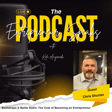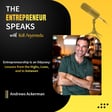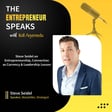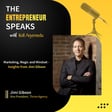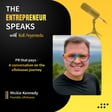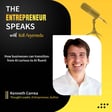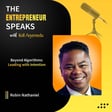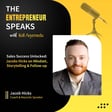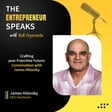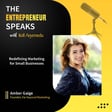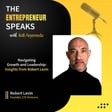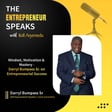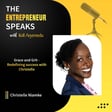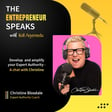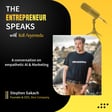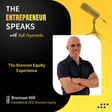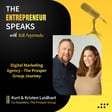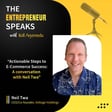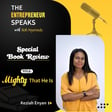Opening Poetic Lines
00:00:07
Speaker
Dreams light the sky tonight. Builders of tomorrow shining bright. From every land they find their beat. Yeah, it's the entrepreneur speaks.
00:00:20
Speaker
Stories rise. Visions fly. Lessons learned. Dreams run high. This is the entrepreneur.
Introduction to James Brown
00:00:51
Speaker
Dream it, build it, speak it The entrepreneur speaks Dreams light up the sky tonight Our guest today is James Brown, the CEO and founder of Business Accelerator Institute and Perseverance Square.
00:01:12
Speaker
With a background in law and business, James launched his first successful business in 1994 and later transitioned to coaching, where he has driven significant growth for over 350 business owners nationwide.
00:01:28
Speaker
He's also the co-author of the best-selling book, Shift Happens, and a recognized industry expert. Get ready for insights on strategic management, marketing, and building a thriving business.
00:01:43
Speaker
Welcome to my show, James. Thank you so much, Kofi, for having me. I'm excited to be here today. All right. So let's start off with you telling us a bit...
James' Journey from Law to Business
00:01:54
Speaker
about your background and your childhood. Yeah, so i so I actually started the business before these two, before Business Accelerator Institute and Perseverance Squared.
00:02:06
Speaker
I went to law school. i got married when I was 19 and I worked on the assembly line at a factory while I was going to school. And when I graduated law school, that factory had closed. So I sent out a bunch of resumes to get a job as a as a lawyer and I got no responses out of 200 resumes I sent out.
00:02:29
Speaker
So it forced me to kind of go into business on my own. And the time I started that business, In 1994, I had a five-year-old, a two-year-old, and a one-year-old. And, you know, I vowed from day one that I was going to build a business that allowed me to be there for those kids.
00:02:49
Speaker
It was for their school activities, church activities, everything, and not sacrifice that time with them in order to have a business. ah Ultimately, I built that law firm to $8 million dollars a year.
00:03:05
Speaker
with offices in four different states in the United States. And i never missed a single moment of them growing up. um And that was my where I kicked off my journey to becoming an entrepreneur.
00:03:23
Speaker
and All right. So we'll delve deep into your journey as an entrepreneur as we converse. um But you founded both Business Accelerator Institute and Perseverance Squared. I like that name, Perseverance Squared.
00:03:36
Speaker
Can you tell us about these businesses?
Founding Perseverance Squared
00:03:39
Speaker
Absolutely. So um I didn't have any partners or anything in the law firm. um My kids weren't interested in becoming lawyers. So I always knew that my end game with that business was to sell it.
00:03:53
Speaker
And so I told my wife, I said, look, I think we can help more people. If I sell the firm and then I go into consulting with teaching people, entrepreneurs, how to start and operate a business.
00:04:08
Speaker
um So I sold the business when I was 49 years old. And then ah in 2018, I started coaching individual entrepreneurs on how to work.
00:04:21
Speaker
launch a business, how to grow it and scale it while not sacrificing your time with your family. um One of the things that was important to me through my entire entrepreneurial career was I was told repeatedly that I wasn't going to succeed.
00:04:38
Speaker
And I pushed back on that and I said, i could do whatever I set my mind to. And that's where the name perseverance squared comes from.
00:04:49
Speaker
It's actually a tattoo here on my arm is perseverance. And and so It doesn't matter what stories other people tell us or what they believe we can do or what we can't.
00:05:01
Speaker
It's right in here. And if you believe you have the passion to do something, don't listen to all the people who tell you that you can't do it and just set forth a plan and go out and accomplish it.
00:05:14
Speaker
And so that's what I did with Perseverance Squared. I started that business um in October of 2023. So a little bit over a year and a half ago. um Our first year in business was 2024, we did almost that year.
00:05:32
Speaker
Now I'm looking to help additional people. i've I've started the business Business Accelerator Institute. And this is so that I can help entrepreneur to entrepreneurs around the world with how to grow and scale their business by looking at the seven basic parts that exist in every business.
00:05:55
Speaker
And if you look at it that way, The concept of running a successful business is very simple. Nobody ever is going to tell you that it's going to be easy, but the concept is simple as long as you recognize that your business has the same seven working parts as every other business.
00:06:16
Speaker
The only thing that's different is what we sell. I sold legal services. um A client of mine right now sells um ah dental services. I have another client that sells shades um for your patio. So it's just a difference in what we sell, but the same seven parts are are exist in every single business, out
00:06:42
Speaker
I'm very interested in the seven basic parts you just mentioned. So I don't know whether you can walk us through the seven basic parts. Can you quickly walk us through what the seven basic parts really are?
The Seven Basic Parts of a Business
00:06:54
Speaker
Absolutely. The first is marketing. um The second is sales. The third is your factory or your infrastructure for how you're going to deliver what you sell.
00:07:08
Speaker
Your fourth is your physical plant, which is do I have a brick and mortar location or do I or do i have a virtual business?
00:07:18
Speaker
um Your fifth is your money ah your people to run the factory, So you need people to run the systems and procedures in order to produce what it is you sell.
00:07:31
Speaker
The sixth thing is your money and metrics. So what KPIs do we have in place? What financial ah reports do we have in place?
00:07:42
Speaker
And then the seventh part of the business is you, the business owner. what is the mindset work that you have to do in order to become that business or um owner that you want to be?
00:07:55
Speaker
If I, if I'm currently a business that generates 500,000 and I want to be a million dollar business owner, what do I got to do to improve my mindset to think like the owner of a million dollar business or a $2 million dollar business or an $8 million dollars business?
00:08:12
Speaker
And so Without that seventh part of the business, you, the business doesn't exist. So that actually is the most important of the seven parts.
00:08:26
Speaker
I'd want us to delve into some details as we converse. We'll delve into some details and touch on especially marketing and also the mindset.
00:08:37
Speaker
so So you've been around for quite some time. You started off with your law firm and you moved on to to and to set up your businesses, your current businesses. um I'm sure like any entrepreneurial journey, there's been ups downs.
00:08:54
Speaker
Can we start by talking about you're down your your low moments? Can you share some of these low moments are with us and how you were able to overcome these low moments?
Overcoming Business Challenges
00:09:05
Speaker
Yeah, I think in every business, if anybody ever tells you that all you're going to have is up moments, they're lying to you. um I would never tell that to anybody because you're going to have those moments where you feel like you're not progressing um or maybe the revenue is not where you want it or maybe the revenue is where you want it, but you're not making any profit.
00:09:27
Speaker
um So there's going to be natural up and downs in the business. And it's very easy to run a business when everything is up. You know, in fact, it's yeah it's easy to get a business out of control when everything is up.
00:09:42
Speaker
When it goes down, you have to have something to lean on. and when I say go down, um it could be factors outside your control.
00:09:52
Speaker
You know, when I ran my law firm, I concentrated on one area of that And there was a a ah legislation passed that dramatically changed the landscape of that area of law. And it almost it put a lot of people out of business with that one change. And it was through no control of ours.
00:10:15
Speaker
So that was a, I lost 60% of my business during that time. And so one of the things you have to to overcome in order to get through those down parts is literally the mindset.
00:10:30
Speaker
One of the very first things I'll talk to entrepreneurs about is, what is your why? Why are you doing this? Why are you choosing to start a business rather than just go work for somebody?
00:10:44
Speaker
And out of all the businesses you could start, why this one? Why is this important to you? you know and And when you have a strong why,
00:10:56
Speaker
That is what you anchor to when you have those down times, because that's going to get you through. um I remember a specific day in my business where my wife was out of town and I've got kids that were like nine, five and four.
00:11:12
Speaker
And I had to be in court at nine o'clock and I'm getting them ready. I told him, come on down. Breakfast is ready. Let's get ready for school. They come down. My middle one has is a shirt on inside out. So we're changing his shirt.
00:11:26
Speaker
um They're eating their breakfast. My little one pukes on herself right there. And so we changing her clothes. I go to get him in the car and it's pouring down rain. So while I'm getting them in the car seat, the other middle child now throws up and I'm like taking him back in and changing clothes.
00:11:46
Speaker
I come to take him back to the car and I literally slipped on the top step and bounced all the way down the stairs. I get him in the car. I'm on my way. And my oldest says he needs money for a field trip.
00:12:00
Speaker
I've got to stop at the ATM. Then I had a flat tire on the way to the school. I'm out changing the tire and then I'm soaking wet and I'm running back home to change and I still made it to court by nine.
00:12:14
Speaker
Right. And I'm like, those days are going to happen. And what makes me come back the next day to do it again and again and again?
00:12:25
Speaker
And literally, if I look at that day, the reason all those things were happening was because I was trying to corral a nine-year-old, a five-year-old, and four-year-old, but they were my why.
00:12:36
Speaker
they were my why. And I would do it again any day of the week. you know And so anytime I was having a hard time or a low in the business, I always anchored to my why.
00:12:47
Speaker
Thank you for sharing this with us. um Now let's talk about marketing. So how has market in your marketing approach developed from your early led days up until now? That's a very, very good question. and one of the traps that I see entrepreneurs get into is You know, you have this great idea or maybe you worked for somebody else and you're like, wait, I can go do this on my own and make more money.
00:13:13
Speaker
And so you go and you you open your doors and you're in business and you're not really sure what to do. So you just look at what everybody else is doing and then you copy it.
00:13:26
Speaker
right and And what I learned, i started i was gidy I was doing the same thing. I copied what other lawyers were doing and I was getting very mediocre results.
00:13:37
Speaker
And when i so I started looking into the human buying process, and I didn't know there was such a thing, but there is a process we go through as individuals.
00:13:48
Speaker
We actually make decisions on the emotional side of our brain. And then the logical side of the brain is where we look for justification for those decisions. It's where buyer's remorse lives.
00:14:02
Speaker
And what I noticed was most of the marketing messages that are out there appeal to the logical side of the brain. It talked about how many years experience the lawyer has or this or that.
00:14:16
Speaker
And so I decided to change my marketing message and I appealed to the emotional side of the And before I made this change, we were so we were averaging about two sales a week.
Emotional Marketing Strategies
00:14:31
Speaker
And the first week that I ran these new marketing messages, we had 68 sales in seven days. um The second week was 72 sales. The third week was 63 sales.
00:14:44
Speaker
And I knew from that moment on, I was on to something. um And that was one of the biggest lessons I learned in business was my number one rule is be different.
00:14:55
Speaker
and okay And here's why. The average consumer, when we have a problem that we're trying to solve, the brain goes into search mode and is trying to find a solution. So now we have the Internet, right? And we can type in anything that we're having a problem with and literally thousands and thousands of possibilities come up.
00:15:19
Speaker
um I was looking for an outdoor television about two years ago. And where I live, it gets kind of really cold, you know, in the wintertime. So I needed a TV that was going to survive that cold weather out there.
00:15:33
Speaker
um So I searched for outdoor TV and there was literally like hundreds of them and I couldn't tell them apart. The descriptions all look the same. When the human brain sees all of these marketing messages that look the same, it gets confused.
00:15:52
Speaker
And so it shuts down and the default is lowest price. Right. I don't want people coming to me because they're looking for the lowest price.
00:16:03
Speaker
So by being different in my marketing messages, I was able to stand apart from all the other competition and enter the conversation that's going on in my prospect's head.
00:16:17
Speaker
And when I can do that, I can have effective marketing messages and dominate the market. And any business can do this. the trap they fall into is just doing what everybody else does and not being different.
00:16:32
Speaker
Thank you, James, for sharing this point. So we need to be different. We shouldn't follow the crowd. We shouldn't join the bandwagon. Yeah, yeah, yeah. Thank you. Thank you for sharing this. So what indeed are the key ingredients in building not just a profitable business, but also one that thrives, a thriving business?
00:16:49
Speaker
I think the key ingredients are going about it in a very intentional way, starting with a business plan that addresses all seven parts of the business.
00:17:02
Speaker
You know, for example, if my business, if I have somebody that comes to me and they say, well I'm making $300,000, my business made $300,000 this year. Okay. What do you want to make next year? Well, I just want to do more.
00:17:17
Speaker
do more what, right? Find what that is. Oh, i just want to double my revenue. Why do you want to double your revenue? Okay. And, and do you have a plan to double your revenue?
00:17:31
Speaker
So if you want to go from 300,000 to 600,000, what is your average sale value? If your average sale value is $5,000, well, we know you need 60 sales next year.
00:17:44
Speaker
Okay. Okay. No, if your average value is 10,000, we need 60 sales. So if you need 60 sales, how many people do you need to talk to in order to sell to 60 people?
00:17:57
Speaker
How many appointments need to be set or customers to come in for you to be able to talk to x amount of people? And you back into how many leads you need. Now I can tell my marketing team,
00:18:10
Speaker
how many leads I need coming in or calling in order to talk to this many people in order to make 60 sales, right? I'm building out each section of my business plan as we reverse engineer this.
00:18:25
Speaker
Now I look at, well, what happens if I double my revenue? That means I doubled my number of of things I've sold next year. Who's going to do the work?
00:18:37
Speaker
How are we going to produce it? Who am I going to need to hire and when? right and And so if you have a plan for all of that, now you can watch leading indicators. Okay, my leads are up.
00:18:50
Speaker
I see more customers coming in. We're making more sales. Maybe I should start recruiting for this person because these leading indicators are happening. on You should review that business plan every quarter. Am I on track or am I not on track?
00:19:07
Speaker
If I'm not on track, what adjustments do I need to make? If I'm ahead of where I thought I would be, maybe I need to amend my business plan and and shoot for a higher number, right? So a lot of people, if they even do a business plan, they'll put it away in a drawer and they never looked at it, right?
00:19:27
Speaker
And so that's one of the keys is when you systematically have a business plan that addresses all the seven parts so that you know if A happens, then you're going to do B.
00:19:39
Speaker
If B happens, you're going to do C and so forth. The other thing I would say is making sure in your business that you're making decisions based on data and not emotion.
00:19:54
Speaker
Right. we We all say, oh, well I have a gut feeling and we'll make a decision. I think this marketing will work. So we throw money at it and then we lose that money. Right. But make decisions in your business based on data.
00:20:08
Speaker
You're going to save yourself a lot of money and a lot of time in getting to a profitable business. Hmm. Thank you once again for this, James.
00:20:19
Speaker
So you're also the co-author of the book, Shift Happens. So I want us to spend some time talking about this book and what really inspired you to put together this book.
Inspiration for 'Shift Happens'
00:20:29
Speaker
So why the name Shift Happens?
00:20:32
Speaker
Why the name Shift Happens? That book was written in 2008 and 2009. And at that time in the United States, there was a big shift in the economy.
00:20:45
Speaker
um It was called the mortgage crisis. And all of these foreclosures were happening and inflation was shooting way up and all of the job, a number of unemployment was way up.
00:21:00
Speaker
And so people started losing their homes and there was this big shift in the economy. And a lot of business owners were wondering, how do we address this shift?
00:21:12
Speaker
Right. And so it prompted me to to write this book, Shift Happens. It's going to happen. Right. It's going to happen several times throughout our lifetime. It's happening again right now in the United States.
00:21:25
Speaker
um So how do you adapt? How do you pivot your business When you see a shift happening, instead of just sitting back and going, woe is me, I can't do anything about this because the economy is changing.
00:21:44
Speaker
And so the idea behind the book was shifts is going to happen. It could be um during COVID, a lot of things changed with regard to being able to find employees, to actually working in businesses, and and it created this big remote job industry.
00:22:04
Speaker
And now to this day, even though COVID is long behind us, there was a major shift in how we employ people. And most people are looking for at-home opportunities, right? So how did we adapt to that shift? So that book was about how to recognize shifts in the economy, in the employment, in your business, and how to adapt and pivot because of it.
00:22:33
Speaker
you Okay. So how has that book, Shift Happens, has that book, has it inspired the way you you engage with your entrepreneurs? It has, because one of the things I tell them is be comfortable getting, be be comfortable being uncomfortable, right?
00:22:50
Speaker
Because when you get comfortable, oh man, the economy is great. My business is booming. um i can just sit back and coast. And then you're not ready to pivot when something happens. Right.
00:23:06
Speaker
So always be on the lookout. I'm always thinking two or three quarters ahead. And I'm always looking for things that might change the way my business operates so that I know that if this happens, I pivot to this.
00:23:23
Speaker
Right. And so I use that conversation all the time to make sure people aren't getting comfortable because when they get comfortable, they stop making the necessary decisions in their business to keep it moving forward.
Myth of Personal Sacrifice in Business
00:23:39
Speaker
You also talk about breaking the sacrifice myth. What does that mean? What does breaking the sacrifice myth, what does that mean Well, I mean, Kofi, if I've heard it a hundred times, I've heard it a million times that, you know, it's just when you own your own business, you got to do what it takes. You have to work 80 hours a week. it's just what it takes to mate so make it successful.
00:24:03
Speaker
And that's actually the myth. It's called the doctrine of sacrifice. um When you are sacrificing your family and your life and your health in many cases, because you're stuck working in the business 80 plus hours a week, 24 seven.
00:24:25
Speaker
If you have a business that operates like that, what have you really got? You literally bought yourself a 24-7 job that, and now you don't see your family. You're never home for dinner. You're missing all of their school events.
00:24:40
Speaker
And so what I want people to know is that is just a myth. Right. You can create something like I told you earlier that my very first thing, because I had a five year old, a two year old, one year old was I was going to build a business that I wasn't stuck to for 80 hours a week.
00:25:00
Speaker
I left every day at 430. OK, now the business was open till 7 p.m., but I wasn't there. right And so I broke for myself that myth that I have to be here constantly.
00:25:16
Speaker
I think one of the biggest benefits to owning your own business is buying your time back. So that when my middle son at 11 years old, he made a, a, an ice hockey team, um, that was, that was team USA and they were going to travel to Europe and play for 30 days.
00:25:38
Speaker
And I was able to drop everything and go with them. And I was in, in Europe and my business didn't miss a beat. hey I was able to spend a majority of my career um volunteering with the American Red Cross and being deployed to natural disasters for 30 to 40 days at a time with no access. Because when you have a hurricane or something like that, cell coverage is down, everything's down.
00:26:06
Speaker
And so my business doesn't miss a beat. Right. And so how do you get it there? Well, it's setting up systems and procedures and hiring the right people so that it doesn't depend on you to be the one to do it.
00:26:23
Speaker
And I think that is how you break that doctrine, that that myth of the doctrine of sacrifice. yeah so So still on that point, ah many entrepreneurs feel they must choose between business success and also personal life.
00:26:39
Speaker
How can they rethink this kind of notion? I think the first thing is this is all mostly about mindset. It's I'm the one that has to do this. I can do this better than anybody.
00:26:54
Speaker
So I'm just going there's no way I can hire other people. so So they they have a lack of trust that other people can do it just as well as they can. And I had the same thing.
00:27:07
Speaker
You know, when I was doing consultations with new clients, I was like, nobody can do this better than me. I was closing 70% of the people I talked to.
00:27:18
Speaker
um And then I hired my first salesperson and he closed 73% of the people he talked to. And that was like, okay, I'm not as important as I thought I was.
00:27:31
Speaker
right Now, I still oversaw sales, but i now I no longer physically had to do it. Then I hired a second salesperson and I was completely out of sales.
00:27:43
Speaker
And that taught me that I need to hire the people that are ah better at doing certain things than I am. And when I do that, now I have complete trust.
00:27:57
Speaker
I just set up the systems and I allow them to come in and run the systems. Now they do it better than I do. i don't have to be working in the business. I can work on it.
00:28:08
Speaker
And that's where you start to free up your time so that you can have your personal. All right. So still on that point. Do you have any boundaries or routines that have generally helped you create that balance between your your family life and your work life?
Balancing Work and Family
00:28:27
Speaker
Yeah, I think the very first thing is is set out from the very beginning that this is what I'm going to do. Like for me, I'm not working more than 40 hours a week. Bottom line, that's it.
00:28:38
Speaker
Now, how do I make it happen? What systems do I have to have in place? What do I got to get off my plate and who's going to do it so that I don't work past 430? Right. But you have to start with what it is you want in your personal life and don't take no for an answer.
00:28:57
Speaker
What do I have to do to make it happen so that I can go golf more. i can go, you know, three months in Europe every year, whatever it is that you want to do in your personal life.
00:29:11
Speaker
Start with that and don't accept no for an answer and figure out what in your business has to change to allow that to happen. Most people won't allow them the permission to do that.
00:29:23
Speaker
So you've been on this entrepreneurial journey for quite some time now. What indeed are the key lessons you've picked up on this journey? um I think the key things that I've learned along the way, number one is and I never stop learning.
00:29:37
Speaker
um I've been doing it for over 40 years now, and I still learn things to this day. I think when you stop learning, you stop growing. I think that before you...
Continuous Learning and Growth
00:29:51
Speaker
grow financially, you have to grow personally and professionally. um to be able to really then kick in and do it financially.
00:30:04
Speaker
um Some of the key things I learned along the way was surround myself with people that are smarter than I am. So joining mastermind groups where I can be in a group of like-minded entrepreneurs that have already done what I'm trying to do.
00:30:22
Speaker
And if I ever get to be the smartest person in the room, it's time for me to change rooms, right? And so that that was one of the keys for me was really getting around like-minded individuals.
00:30:35
Speaker
And that's what I'm doing with Business Accelerator Institute is giving entrepreneurs from around the world the ability to get into groups of like-minded individuals that can help you propel yourself um into that next level.
00:30:52
Speaker
We're just about wrapping up. um So what would be your advice to someone starting their entrepreneurial journey? I say my biggest piece of advice is don't listen to to people who are naysayers or negative people.
00:31:10
Speaker
and Okay? Okay. There's a lot of people out there that I don't think they intend to do it. They're not trying to be mean, but your friends and family and colleagues sometimes, they say things out of their own um perspective. it And when they see you starting to do things that you're going to succeed, and sometimes it's your closest family members.
00:31:36
Speaker
Every time, and this is where sometimes your subconscious mind can can really start to come back and haunt you. um When I was growing up, I had several people that told me, you'll never succeed.
00:31:49
Speaker
Why are you even trying that? Well, I could buy into that or I could say, forget that. I'm going to do what I can do. I know I can do it. And i and so don't listen to other people.
00:32:02
Speaker
if if you There is a common saying that says you're the average of the five people you hang out with the most. And if you're hanging out with negative people, guess what?
00:32:15
Speaker
You're going to stay in that mindset. You have to separate yourself and hang around with people who have that same drive. That same, um it may not be an entrepreneur, but maybe it's an athlete.
00:32:30
Speaker
You know, maybe it's a musician. Maybe it's somebody who is ah breaking through barrier after barrier after barrier after being told several times you're never going to succeed.
00:32:44
Speaker
Those are the people I want to be around because I don't want to listen to the negative people. So my number one word of advice was be careful with who you surround yourself with.
00:32:56
Speaker
Mm-hmm. Thank you so much. So before we sign off, um so how should young entrepreneurs deal with failure and periods of uncertainty?
Learning from Experiences
00:33:05
Speaker
Gotcha. First thing I would say, Kofi, is don't label anything.
00:33:11
Speaker
right When you start to label anything as this is good or this is bad or this is success or this is failure, it shapes your mindset around it. There was times where in my business, you know, I would have payroll coming due in like two days and it was $15,000. And I opened my bank account and there was like a thousand bucks in there.
00:33:35
Speaker
And so I'm like, oh my gosh, this is horrible. I don't know what I'm going to do. And you start this spiral and it's very difficult when you're in that energy level of, I can't do anything about this to spot opportunities.
00:33:52
Speaker
So one thing I learned very early on was don't label anything as success or failure. If I'm going to do something, there's going to be a result.
00:34:05
Speaker
I know the result I want. So if I get that result, great, I got the result. I'm not going to label it as a success. And what did I learn from that? That I can repeat.
00:34:19
Speaker
If I don't get the result, I don't think it's a failure because I'm still going to learn something from it. What did i learn from this that I don't want to repeat?
00:34:31
Speaker
You know, um and now I can put that in place going forward and then I try it again. So the best way to deal with success and failure is look at everything you do is what can I learn from this?
00:34:46
Speaker
Don't label it either way. Because everything that you do, even if it doesn't work out the way you thought, it we learn what not to do the next time. um Before I finally sign off, what would be your last words to my
Perseverance and Big Thinking
00:34:59
Speaker
audience? audience I think the last words I would say is we've been put on this earth to accomplish great things.
00:35:11
Speaker
One of the biggest mistakes I'll see people make is they think too small. Think bigger. Right. Don't be constrained by your current situation. You can break beyond that.
00:35:24
Speaker
And that's where perseverance comes in. Be able to persevere through anything that's put in your way. There's going to be obstacles thrown in your way. You got to bust through that.
00:35:36
Speaker
um And so my biggest piece of advice would be to keep pushing forward. um In the book, Think and Grow Rich by Napoleon Hill, there's a section in there called Three Feet from Gold.
00:35:53
Speaker
And there was a prospector in the United States way back in the gold rush days that left his family on the East Coast and went West to chase gold. And he bought this stake of land and he borrowed money against it from all of his family.
00:36:10
Speaker
And he dug for gold and he dug for gold and he did this for years and years and years and never found gold. And then he freaking quit. And he sold it for very, very small amount of money. And he went back home and basically considered himself a failure.
00:36:29
Speaker
The person who bought that from him found gold three feet later. And it was the largest gold vein in U.S. history. And so that guy quit being three feet from gold.
00:36:44
Speaker
Don't quit. You never know when you're three feet from gold. Keep pushing. That's what perseverance is all about. Keep pushing. And these are the nuggets from my guest, James Al Brown.
00:36:56
Speaker
Thank you, James, for sharing your rich experience with us today on the Entrepreneur Speaks podcast. We wish you the very best. I thank you so much, Kofi.
Episode Wrap-Up
00:37:05
Speaker
And if your listeners want to find out more, we have, we've built out a webpage just for them. It's businessaccelerator.institute forward slash entrepreneur speaks.
00:37:18
Speaker
Please repeat that. Sure. It's businessaccelerator.institute forward slash entrepreneur speaks. Just like the name of your podcast.
00:37:31
Speaker
Thank you. Thank you once again, James. So this has been another exciting episode of the Entrepreneur Speaks podcast. We'll come your way next time with another inspiring episode.
00:37:43
Speaker
I remain your host, Kofi Animedu. As always, do take good care of yourself and let's continue to keep hope alive. Cheers. Please be sure to subscribe to the Entrepreneur Speaks podcast on all your favorite podcast channels. And if you have any questions or feedback, feel free to reach out to us on social media or in the comments section below.
00:38:10
Speaker
Dreams light up the sky tonight. Builders of tomorrow shining bright. From every land they find their beat.
00:38:20
Speaker
Yeah, it's the entrepreneur speaks.

